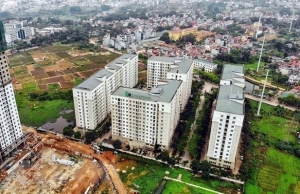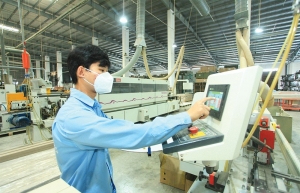Expert analysis of last year's development gains and challenges for 2023
What’s your assessment of GDP growth in 2022?
 |
| Le Trung Hieu |
The first three quarters of 2022 witnessed the prosperity of Vietnam's economy after two years of being hit hard by the pandemic.
Entering Q4, however, the economic situation became more difficult when the industrial sector turned to decline. Some key processing and manufacturing industries slowed their growth or even witnessed negative growth, such as metal production, prefabricated metal products, electrical equipment, rubber, plastics, tobacco, and coal mining.
The top performers in the processing and manufacturing industries such as textiles and apparel, footwear, electronic products, and computers all decelerated in Q4.
It is very unfortunate that when preparing for socioeconomic development in 2023, we had to witness the dissolution of more than a few businesses and many employees incurred reduced working hours. This situation was rooted in many external factors and some domestic causes.
What are the external factors casting negative impacts on Vietnam’s economy?
In my opinion, there are three external factors that negatively affected Vietnam's economy in 2022.
Firstly, global consumer demand weakened – which stemmed from the tightening of monetary policies in the US and EU countries to control inflation – causing a decrease in consumption. This negatively affected Vietnam's import-export businesses as those areas are Vietnam's major trading partners outside of China. Many Vietnamese enterprises had their orders cut so they were forced to downsize their production.
| "The sharp drop in export growth since September is an inevitable consequence of production and business activities facing difficulties due to both domestic and foreign factors." |
Secondly, the shortage of raw material supply as China shut down its economy to implement its Zero-Covid policy led to a wave of disruptions around the world.
This had a direct impact on Vietnam because the nation’s many industries, including textiles, chemicals, metal production, electronic components, and more, are heavily reliant on China.
Finding new replacements for the broken supply chain has become even more difficult because access to new markets is limited by the Russia-Ukraine conflict, the global economic slowdown, and spiking transportation and logistics costs.
Thirdly, input costs are high due to non-technical factors. The Russia-Ukraine conflict has divided the world's supply and demand and at the same time impeded access to the international market, pushing up the prices of many essential commodities due to the inflated input costs.
What about the internal factors?
In the domestic market, the interest rate has increased sharply, especially the negotiated deposit rate, which is fetching very high. This causes consumption to decline and limits production.
Public investment has fallen significantly below projections due to obstacles at different stages. Especially in institutions, legal regulations are hindering the implementation of public investment in most localities, ministries, and sectors. This has had a real impact on Vietnam's economic rebound plan.
Although the economy has gradually opened since October 2022 and the old normal has returned since the beginning of March 2022, the internal capacity of the business sector has not yet rebooted. There has been a slew of difficulties in terms of the output market and the fall in orders has caused many businesses to reduce production and slash labour.
The decrease in monthly export growth since September 2022 is deemed to be the cause of the low GDP growth rate in Q4 2022. Is that the case?
After reopening, Vietnam's economy rebounded strongly in 2022, especially in the middle of the year. GDP growth in Q3 touched 8.85 per cent with healthy growth seen in most economic sectors. Many industries have almost returned to pre-pandemic levels. This shows that Vietnam has adapted and effectively availed of development opportunities. However, in Q4, the situation worsened for the reasons I mentioned earlier.
The sharp drop in export growth since September is an inevitable consequence of production and business activities facing difficulties due to both domestic and foreign factors.
What should we do in this situation to achieve growth stability?
Vietnam’s total import-export value has exceeded $700 billion, turning Vietnam into one of the 20 best-performing economies in terms of import-export activities worldwide.
At the time of a trade war between economic powers, both Vietnam's export and import activities still grew strongly.
Therefore, it can be concluded that Vietnam’s decreasing export value in Q4 was not because of its internal production capacity but mainly due to the world’s declining demand, leading to a situation where local businesses were unable to sign more contracts to bolster production.
To limit and overcome this downward trend, it is necessary to stimulate domestic market demand.
Besides this, there is a need to have a radical, long-term solution in place. Increased localisation, the development of supporting industries by Vietnamese enterprises, and calling on FDI will avoid having to rely too much on imported materials.
The state should also implement policies to support businesses in the above industries by delaying tax payments or supporting loan interest rates, helping firms to maintain production and minimise labour cuts.
 | Several consequences to be felt in real estate in 2023 Although there have been supportive signs for the market, real estate in 2023 is expected to be still affected by the declining confidence of homebuyers, obstacles in the legal framework, and scarce capital sources. |
 | Economy preparing for tricky 2023 Growth in Vietnam’s economy may slow down next year due to massive complexities, including a reduction in global demand caused by tightened spending. |
What the stars mean:
★ Poor ★ ★ Promising ★★★ Good ★★★★ Very good ★★★★★ Exceptional
Related Contents
Latest News
More News
- State corporations poised to drive 2026 growth (February 03, 2026 | 13:58)
- Why high-tech talent will define Vietnam’s growth (February 02, 2026 | 10:47)
- FMCG resilience amid varying storms (February 02, 2026 | 10:00)
- Customs reforms strengthen business confidence, support trade growth (February 01, 2026 | 08:20)
- Vietnam and US to launch sixth trade negotiation round (January 30, 2026 | 15:19)
- Digital publishing emerges as key growth driver in Vietnam (January 30, 2026 | 10:59)
- EVN signs key contract for Tri An hydropower expansion (January 30, 2026 | 10:57)
- Vietnam to lead trade growth in ASEAN (January 29, 2026 | 15:08)
- Carlsberg Vietnam delivers Lunar New Year support in central region (January 28, 2026 | 17:19)
- TikTok penalised $35,000 in Vietnam for consumer protection violations (January 28, 2026 | 17:15)

 Tag:
Tag:


























 Mobile Version
Mobile Version